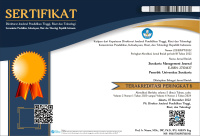PENGARUH BRAND CREDIBILITY DAN SELF BRAND CONNECTION TERHADAP LOYALITAS MEREK PADA INDUSTRI FAST FOOD
Abstract
Keywords
Full Text:
PDFReferences
Alam, A., Usman Arshad, M., & Adnan Shabbir, S. (2012). Brand credibility, customer loyalty and the role of religious orientation. Asia Pacific Journal of Marketing and Logistics, 24(4), 583–598. https://doi.org/10.1108/13555851211259034
El-Baz, B. E.-S., Elseidi, R. I., & El-Maniaway, A. M. (2018). Influence of Electronic Word of Mouth (e-WOM) on Brand Credibility and Egyptian Consumers’ Purchase Intentions. International Journal of Online Marketing, 8(4), 1–14. https://doi.org/10.4018/ijom.2018100101
Erdem, T., Swait, J., & Louviere, J. (2002). The impact of brand credibility on consumer price sensitivity. International Journal of Research in Marketing, 19(1), 1–19. https://doi.org/10.1016/S0167-8116(01)00048-9
Escalas, J. E. (2004). Narrative Processing: Building Consumer Connections to Brands. Journal of Consumer Psychology, 14(1–2), 168–180. https://doi.org/10.1207/s15327663jcp1401&2_19
Escalas, J. E., & Bettman, J. R. (2003). You Are What They Eat: The Influence of Reference Groups on Consumers’ Connections to Brands. Journal of Consumer Psychology, 13(3), 339–348. https://doi.org/10.1207/S15327663JCP1303_14
Haq, M. I. U., Khaliq Alvi, A., Somroo, M. A., Akhtar, N., & Ahmed, A. (2022). Relationship of brand credibility and brand loyalty: the mediating effects of attitude toward brand. Journal of Economic and Administrative Sciences. https://doi.org/10.1108/jeas-08-2021-0142
Jr, J. F. H., Black, W. C., Babin, B. J., Anderson, R. E., Black, W. C., & Anderson, R. E. (2018). Multivariate Data Analysis. https://doi.org/10.1002/9781119409137.ch4
Kemp, E., & Bui, M. (2011). Healthy brands: Establishing brand credibility, commitment and connection among consumers. Journal of Consumer Marketing, 28(6), 429–437. https://doi.org/10.1108/07363761111165949
Kwon, E., & Mattila, A. S. (2015). The Effect of Self–Brand Connection and Self-Construal on Brand Lovers’ Word of Mouth (WOM). Cornell Hospitality Quarterly, 56(4), 427–435. https://doi.org/10.1177/1938965514566071
Maathuis, O., Rodenburg, J., & Sikkel, D. (2004). Credibility, Emotion or Reason? Corporate Reputation Review, 6(4), 333–345. https://doi.org/10.1057/palgrave.crr.1540003
Papista, E., & Krystallis, A. (2013). Investigating the Types of Value and Cost of Green Brands: Proposition of a Conceptual Framework. Journal of Business Ethics, 115(1), 75–92. https://doi.org/10.1007/s10551-012-1367-6
Richard, L. (1999). Whence consumer loyalty ? Journal of Marketing, 63(Special Issue 1999), 33–44.
Rifi, A., & Mostafa, R. B. (2022). Brand credibility and customer-based brand equity: a service recovery perspective. Journal of Financial Services Marketing, 27(1). https://doi.org/10.1057/s41264-021-00097-x
Rizwan, M., Javed, P. A., Aslam, J., Khan, R., & Bibi, H. (2014). The relationship of Brand Commitment, Brand Credibility, Perceived Quality, Customer Satisfaction and brand loyalty: an empirical study on Stylo shoes. Journal of Sociological Research, 5(1), 377–404. https://doi.org/10.5296/jsr.v5i1.6572
Sekaran, B. (2016). An easy way to help students learn, collaborate, and grow. www.wileypluslearningspace.com
Shugan, S. M. (1980). The Cost of Thinking. Journal of Consumer Research, 7(2), 99. https://doi.org/10.1086/208799
Stokburger-Sauer, N., Ratneshwar, S., & Sen, S. (2012). Drivers of consumer-brand identification. International Journal of Research in Marketing, 29(4), 406–418. https://doi.org/10.1016/j.ijresmar.2012.06.001
Thanh, N. N. D., Thanh, N. D., Thuy, L. T. T., Thuy, D. M., Thao, N. T. T., & Thanh, T. N. P. (2020). The mediating role of self-brand connection and brand identity in the relationship between brand credibility and brand loyalty. Hcmcoujs - Economics and Business Administration, 10(2), 112–129. https://doi.org/10.46223/hcmcoujs.econ.en.10.2.562.2020
van der Westhuizen, L. M. (2018). Brand loyalty: exploring self-brand connection and brand experience. Journal of Product and Brand Management, 27(2), 172–184. https://doi.org/10.1108/JPBM-07-2016-1281
DOI: http://dx.doi.org/10.52429/smj.v5i1.1067
Refbacks
- There are currently no refbacks.

This work is licensed under a Creative Commons Attribution-NonCommercial 4.0 International License.






